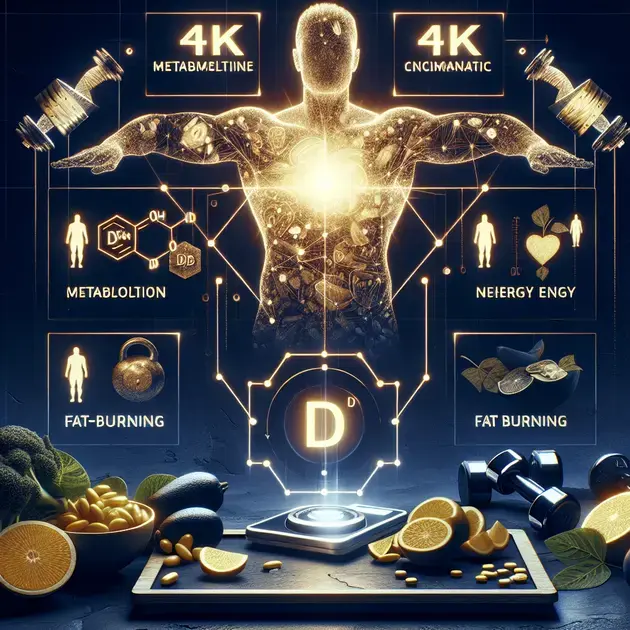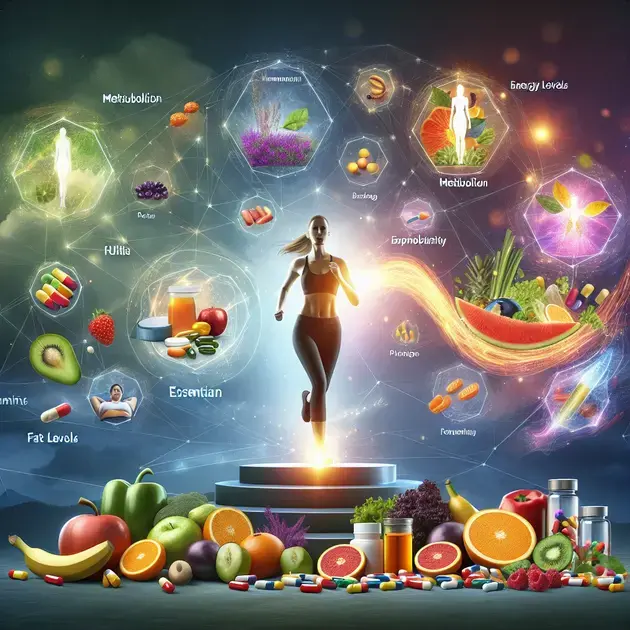Are you looking to boost your weight loss journey with some extra help? One effective way to enhance your results is by incorporating essential vitamins into your daily routine. These vitamins not only support your overall health but can also play a key role in helping you achieve your weight loss goals.
Research has shown that certain vitamins, such as vitamin D, B vitamins, and vitamin C, can help improve metabolism, increase energy levels, and support the body’s natural fat-burning processes. By ensuring you’re getting an adequate intake of these essential nutrients, you can optimize your weight loss efforts and see better results in a shorter amount of time.

Enhance Your Weight Loss Journey with Vitamin D
Vitamin D plays a crucial role in weight loss by promoting the absorption of calcium in the body, which can help to reduce fat mass. To enhance your weight loss journey with Vitamin D, consider incorporating foods rich in Vitamin D such as fatty fish, eggs, and fortified dairy products into your diet. Additionally, spending time in the sun can also help your body produce Vitamin D naturally.
If you’re looking to track your Vitamin D intake, you can use the app “MyPlate” by Livestrong. This app allows you to log your daily food intake and track the vitamins and minerals you consume, including Vitamin D. By monitoring your Vitamin D levels and ensuring you meet the recommended daily intake, you can support your weight loss efforts effectively.
Another way to enhance the benefits of Vitamin D for weight loss is to include regular physical activity in your routine. Exercise can help boost metabolism and optimize the effects of Vitamin D on fat loss. Consider using fitness apps like “Nike Training Club” to access workout routines that can complement your Vitamin D intake for better weight loss results.
In addition to dietary sources and sun exposure, you can also consider taking Vitamin D supplements to support your weight loss journey. Consult with a healthcare provider to determine the appropriate dosage of Vitamin D supplements for your needs and incorporate them into your daily routine for maximum benefits.
By harnessing the power of Vitamin D through dietary sources, sun exposure, exercise, and supplementation, you can enhance your weight loss journey and achieve your fitness goals more effectively.
Boost Metabolism and Energy with B Vitamins
B Vitamins play a critical role in supporting metabolism and energy production in the body. To boost your metabolism and energy levels with B Vitamins, focus on incorporating foods rich in B Vitamins such as whole grains, meat, fish, and leafy greens into your diet. These foods can provide you with the essential nutrients needed to optimize your metabolic processes and enhance energy levels.
To ensure you’re meeting your daily B Vitamin requirements, you can use the website “Nutrition.gov” to access information on the recommended daily intake of B Vitamins for different age groups. By understanding the specific B Vitamin needs for your age and gender, you can tailor your diet to support optimal metabolism and energy production.
In addition to dietary sources, you can also consider taking B Vitamin supplements to boost your levels and support your metabolism. Look for reputable brands that offer B Complex supplements and consult with a healthcare provider to determine the right dosage for your needs.
Regular exercise is another key component in enhancing metabolism and energy levels with B Vitamins. Physical activity can help stimulate metabolic processes and improve energy utilization, making your B Vitamin intake more effective in supporting weight loss and overall health.
By incorporating B Vitamin-rich foods, supplements, and exercise into your routine, you can boost your metabolism, increase energy levels, and support your weight loss journey for long-term success.
Support Your Body’s Fat-Burning Processes with Vitamin C
Vitamin C is known for its antioxidant properties and its ability to support the body’s fat-burning processes. To enhance the benefits of Vitamin C for fat loss, focus on including foods rich in Vitamin C such as citrus fruits, bell peppers, and strawberries in your diet. These foods can help boost your body’s metabolism and aid in the breakdown of fats.
If you’re interested in tracking your Vitamin C intake, you can use the app “MyFitnessPal” to log your daily food consumption and monitor your Vitamin C levels. This app provides nutritional information for a wide range of foods, making it easy to track your Vitamin C intake and ensure you’re meeting your daily requirements.
In addition to dietary sources, consider incorporating Vitamin C supplements into your regimen to support your body’s fat-burning processes. Consult with a healthcare provider to determine the appropriate dosage of Vitamin C supplements for your needs and incorporate them into your daily routine.
Regular physical activity is also essential for maximizing the effects of Vitamin C on fat loss. Exercise can help increase the body’s metabolic rate and enhance the utilization of fats for energy, making Vitamin C more effective in supporting weight loss and overall health.
By combining Vitamin C-rich foods, supplements, and exercise, you can support your body’s fat-burning processes, boost metabolism, and achieve your weight loss goals more effectively.

**Get More Energy and Support Fat Loss with Vitamin B12**
Vitamin B12 Benefits for Energy and Fat Loss
Introduction
Vitamin B12, also known as cobalamin, is a crucial nutrient that plays a key role in energy production and fat metabolism. It is essential for the proper functioning of the nervous system and the formation of red blood cells. In addition to these vital functions, vitamin B12 has been linked to increased energy levels and support for fat loss.
Boosted Energy Levels
One of the main benefits of vitamin B12 is its ability to boost energy levels. This essential vitamin helps convert the food you eat into glucose, which is used by your body as energy. By increasing the efficiency of this process, vitamin B12 can help combat fatigue and promote a sustained level of energy throughout the day.
Support for Fat Loss
When it comes to fat loss, vitamin B12 can be a valuable ally. Studies have shown that adequate levels of vitamin B12 can help increase metabolism and promote the breakdown of fats. By supporting these processes, vitamin B12 may assist in weight management and fat loss efforts.
How to Incorporate Vitamin B12
To reap the benefits of vitamin B12 for energy and fat loss, it is important to ensure you are getting an adequate intake of this nutrient. Vitamin B12 can be found in animal products such as meat, fish, and dairy, as well as in fortified foods and supplements. Including a variety of these sources in your diet can help support your energy levels and weight loss goals.
Conclusion
In conclusion, vitamin B12 plays a critical role in energy production and fat metabolism. By incorporating sources of vitamin B12 into your diet, you can support your energy levels, metabolism, and weight loss efforts. Whether through food or supplements, ensuring an adequate intake of vitamin B12 is key to enhancing your overall health and well-being.
**Optimize Your Weight Loss Efforts with Vitamin E**
The Role of Vitamin E in Weight Loss
Introduction
Vitamin E is a powerful antioxidant that plays a crucial role in supporting overall health and well-being. In addition to its antioxidant properties, vitamin E has been linked to weight loss and metabolic efficiency. By incorporating vitamin E into your diet, you can optimize your weight loss efforts and promote a healthy metabolism.
Antioxidant Benefits
As an antioxidant, vitamin E helps protect your cells from damage caused by free radicals. This can have a positive impact on your overall health and may also support weight loss by reducing oxidative stress in the body. By mitigating this damage, vitamin E can help promote a healthier metabolism and aid in weight management.
Metabolic Support
Studies have shown that vitamin E may play a role in supporting a healthy metabolism. By helping to regulate cellular processes and maintain optimal function, vitamin E can assist in the efficient conversion of food into energy. This can be beneficial for weight loss efforts, as a well-functioning metabolism is essential for burning calories and promoting fat loss.
Incorporating Vitamin E
To maximize the weight loss benefits of vitamin E, it is important to include sources of this nutrient in your diet. Vitamin E can be found in foods such as nuts, seeds, leafy greens, and vegetable oils. Including these foods in your meals can help ensure you are getting an adequate intake of vitamin E to support your weight loss goals.
Conclusion
Overall, vitamin E can be a valuable asset in optimizing your weight loss efforts. By harnessing its antioxidant properties and metabolic support, vitamin E can help promote a healthier metabolism and aid in weight management. Including vitamin E-rich foods in your diet is a simple yet effective way to enhance your weight loss journey and support your overall health.
**Maximize Your Metabolism with Vitamin B6**
The Importance of Vitamin B6 for Metabolism
Introduction
Vitamin B6, also known as pyridoxine, is a key nutrient that plays a vital role in metabolism. This essential vitamin is involved in over 100 enzymatic reactions in the body, including those related to the metabolism of carbohydrates, fats, and proteins. By maximizing your intake of vitamin B6, you can support a healthy metabolism and enhance your body’s ability to burn calories efficiently.
Carbohydrate Metabolism
One of the main functions of vitamin B6 is its involvement in carbohydrate metabolism. This vitamin helps break down glycogen, the storage form of carbohydrates, into glucose for energy production. By supporting this process, vitamin B6 can aid in the efficient utilization of carbohydrates and prevent excess storage as fat.
Fat Metabolism
Vitamin B6 also plays a role in fat metabolism by helping to convert fats into energy. This process is essential for weight management and overall metabolic health. By ensuring an adequate intake of vitamin B6, you can support the breakdown of fats and promote a healthy balance of energy utilization in the body.
Protein Metabolism
In addition to carbohydrates and fats, vitamin B6 is crucial for protein metabolism. This vitamin is involved in the synthesis and breakdown of proteins, which are essential for muscle growth, repair, and overall metabolic function. By supporting protein metabolism, vitamin B6 can help maintain lean muscle mass and optimize your metabolism.
How to Boost Your Vitamin B6 Intake
To maximize the benefits of vitamin B6 for metabolism, it is important to include sources of this nutrient in your diet. Vitamin B6 can be found in foods such as poultry, fish, bananas, and chickpeas. Incorporating these foods into your meals can help ensure you are getting enough vitamin B6 to support a healthy metabolism and enhance your weight loss efforts.
Conclusion
In conclusion, optimizing your energy levels and supporting fat loss can be effectively achieved through the incorporation of key vitamins such as B12, E, and B6 into your diet. Vitamin B12 plays a critical role in energy production and fat metabolism, offering increased energy levels and assistance in fat loss efforts. By ensuring an adequate intake of vitamin B12 through various sources like animal products and fortified foods, you can enhance your overall health and well-being.
Vitamin E, known for its antioxidant benefits, not only protects your cells from damage but also aids in weight loss by reducing oxidative stress and supporting a healthier metabolism. Including vitamin E-rich foods such as nuts, seeds, and leafy greens in your meals can optimize your weight loss journey and contribute to your overall well-being.
Moreover, vitamin B6 is essential for metabolism, playing a key role in carbohydrate, fat, and protein metabolism. By maximizing your intake of vitamin B6 through foods like poultry, fish, and bananas, you can support a healthy metabolism, efficient energy utilization, and facilitate weight management. Embracing these vital vitamins in your diet can significantly impact your energy levels, fat loss efforts, and metabolic efficiency, ultimately leading to a healthier lifestyle and improved well-being.